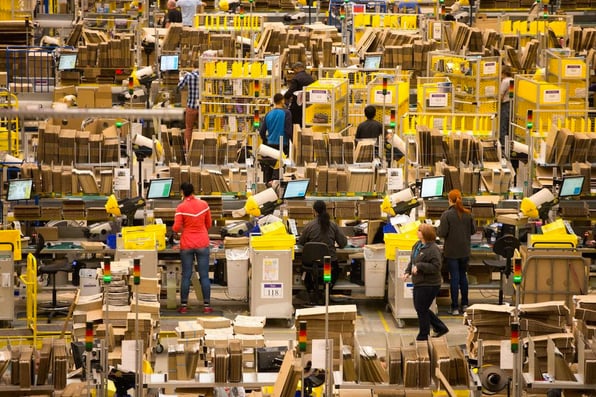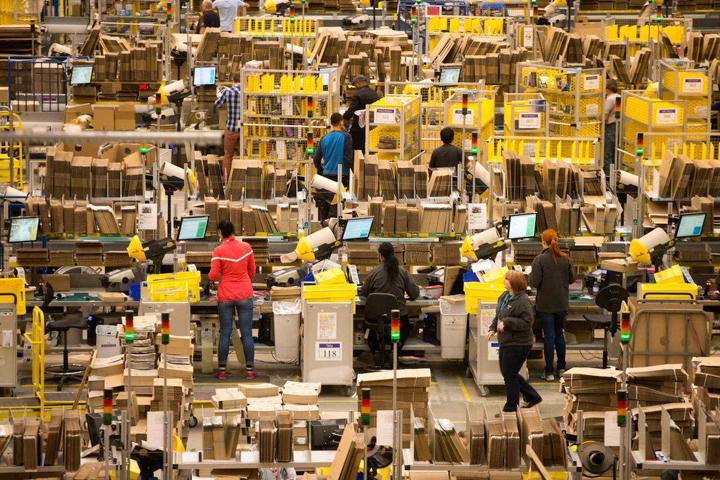What Retailers & Brands Should Know about 'Shipageddon' - A Conversion with Logistics Expert Cathy Roberson


In the last week alone, I couldn't help but notice a new hashtag overtake my Twitter stream. It's the thing every retailer and online store is talking about as we lead up to the Black Friday/Cyber Monday (BFCM) shopping season.
The hashtag? Shipageddon.
Yes, friends, it's a thing. Here are a couple examples:
What I wanna know is, is there really a shipping dooms-day on the horizon? Has the recent drama with the postal carriers just given way to media fodder or is this really something we need to plan for?
I set out to find the answer and understand what the heck is really going on. And what do brands and online retailers need to being now to weather the storm?
To answer these questions, I connected with Cathy Roberson, President of Logistics Trends and Insights, a savant on everything shipping and supply chain.
Logistics is a company focused on market research for the supply chain and provides a boatload (see what I did there) of valuable content such as primary research, surveys, benchmarking, and white papers. Her customers include shippers, manufacturers, logistics startups, traditional freight forwarders, and many others within the supply chain space.
She also writes for air cargo world, as well as the journal of commerce, where she focuses on the last mile, small parcel returns, and spent 11 years with UPS. So net-net, she knows shipping.
Three topics I wanted to address:
- "What trends are seeing in the global supply chain and 'shipageddon a real thing, or all hype?"
- "Will shipping still be an issue after holidays? If so, for how long?"
- "What advice do you have for online stores to better prepare or manage upcoming shipping delays?"
So let's dive in. Watch the short video or check out the transcript below.
Question 1: What trends are you seeing in global supply chain and in last mile? And it is “shipageddon,’ a real thing or is it all hype?
[00:00:17] Cathy: So within the last mile, well, in fact, we've seen a rise in e-commerce, a lot of it. It was already increasing, but when COVID hit, we were all locked down and couldn't leave the house. However, those online orders e-commerce, they've created a mess for UPS and FedEx. All of this stuff is going to residential locations, residential deliveries for UPS and FedEx, as well as supply stops. They're expensive. You think about it, they have to drive up the driveway, get out, walk to the front door, drop the package, ring the doorbell way, or just leave the package.
[00:01:08] It takes up a lot of time. And so, hence that's a lot of costs involved, not to mention the wear and tear of the package cars and the fuel involved. So this is why you see UPS and FedEx encouraging us to drop off or pick up our items at a UPS store, a FedEx store, a Michael's one of their retail partners, because if they can get them all in one central location. That's a less expensive pickup or drop off for them.
[00:01:49] So we see the rise of the increases in cost for them to make these deliveries and the capacity capacity's been tight since March. So yeah, "shipageddon," it's a real thing. I was riding on this back in August, trying to warn retailers. If you have not talked to your last mile provider, better start talking now because they're not going to have enough space on those little package cars. They flat out will not because there is a finite amount of space. And there's still quite a few shippers that are struggling.
[00:02:36] Jess: That's interesting. So I noticed, for example, when Amazon developed a partnership with Kohl's to drop off or pick up packages at Kohl's, I thought the whole strategy was just to get me into a Kohl's. I didn't even think about centralizing the deliveries in one place, but then I think that that's smart to do so,
[00:02:55] Cathy: Yeah. Well, I mean, Kohl's a great to this because I want you to go to their stores. That's been a huge problem for them is they're losing that foot tracking traffic in their retail stores, even though their e-commerce sales have been increasing.
[00:03:09] They've been doing a great job and they've been closing a lot of their stores because it's all about e-commerce. And so those new ones that they have been opening have been smaller or else they've been leasing space to other retailers. So I read somewhere where they they're actually a leasing space to Aldi's.
[00:03:34] So, you know, why you pick up a shirt or pair of pants, so you can just pick up some groceries on your way out as well. So they're doing a number of different things like that, but yeah, they do want you in that store.
[00:03:51] Cathy: With Amazon, Amazon doesn't have a physical location other than their Whole Foods. So it makes sense for them to partner with a storefront retailer, like Kohl's, it's cheaper for them for the returns and such to be one location. So that's also why you've seen Optoro and Staples partnering together and Happy Returns and FedEx store partnering up as well. That is all to drive a single location for point of returns.
Question 2: A lot of this talk around 'shipageddon' is in prep for the holidays in Black Friday/Cyber Monday. Is this going to be way less of an issue after the holidays. Is this going to go away?
[00:04:46] Cathy: Well, that's a big question. I mean, you know, everybody's wondering that. So January is traditionally the month of returns. So you get your package, you get your Christmas presents, you don't like half of them. You normally return them in January. So as far as that month goes, capacity is still going to be a problem.
[00:05:14] After that, it's going to depend a lot on the vaccine. If we have a vaccine ready in time, capacity is still going to be a problem. It's going to be a major problem. I personally think there will be problems because e-commerce is here. So many of us have embraced it more and more now.
[00:05:43] I don't think it will be as bad as much of a concern as it is now, but it's gonna be. It's still relatively tight.
Question 3: Are small businesses? Are they added advantage a disadvantage? Are they being left behind? What's the difference between large retailers and the small businesses?
[00:06:19] Cathy: Well, the beauty for small businesses, I mean the majority of our economy we depend on these small businesses, they are terribly important, so we need to keep, keep them going.
[00:06:33] We stay now the rise of a lot of platforms. Online platforms for them to operate on Shopify is a big one. A lot of them have embraced going on to a Shopify or even just building their own web presence. And the technology tools that are available today are such that they're lower cost for these smaller, smaller players.
[00:07:01] And it really helps level the playing field to compete against the Walmarts, the Nordstrom's, the Kohl's and so on, so they can compete online with these other players, I think, on par with no problem. And again, there are those online platforms that a lot of folks just starting off may want to utilize Shopify, supposedly there's discounts on shipping. And such as that from the FedEx, isn't the UPS's of the world. If you want to use Amazon, there's a lot of pluses using Amazon as well. So, and as well as Walmart's marketplace, why not? And you can also build a store on eBay as well. So there's a lot of options. For small business, which I think is fantastic. 10 years ago, you would not have seen as many options for them.
[00:08:06] Jess: Yeah. It's all omni-channel nowadays.
[00:08:09] Cathy: Exactly.
Question 4: What advice do you have for e-commerce companies? I know you talked a little bit about talking to your last mile provider. Is there anything else brands should be doing to prepare or be better manage issues? What advice do you give them?
[00:08:29] Cathy: When it comes to the last mile, you need to start planning early. You should be planning for the Christmas holiday season, beginning in January.
[00:08:43] Cathy: [00:08:43] And also determine. Okay. So we all love free shipping.
[00:08:51] Free shipping is awesome but someone's paying for that free shipping and it's the retailer. So they need to sit down, review their invoices, their shipping invoices, either work directly with a UPS or FedEx or work with a consulting firm. I'm a little partial to the third party consulting firms because they are impartial and they're not going to sit there and say, you know, you must stay with us all the time.
[00:09:23] So review those invoices. See where you may not need second day air. So review the different service levels also never, ever rely on just one shipping partner always have at least two.
[00:09:52] Don't always depend on UPS, even though I do love UPS, you know, FedEx is also good. Use them, both have that net just in case. Big lesson, learned for a lot of shippers was back in the nineties when the ground division went on strike. And there's a lot of shippers that have not forgotten.
[00:10:26] Jess: Never forget. I can see the slogan already.
[00:10:28] Cathy: Exactly. They have not forgiven. In fact, quite a few totally wrote off UPS and refuses to use UPS still because of that strike. So, FedEx really came into their own. At that time, they gained a lot of new customers, but they're different and they need to be used together.
[00:10:53] Don't write off the post office (USPS) either. They've got a lot of issues going on, but there's still going to deliver this year. People are worried. I have a family members they're like, you know, should I, should I not use them? I'm like, no, use them, please use them because there's going to be delays this year.
[00:11:18] There will be delays regardless of who you use, but, use as many options as you can for that last mile delivery. If you are a storefront, use BOPUS (buy online and pick up in store) and curbside. Those are great, but they should not be your only options because I think as a consumer, we want options.
[00:11:47] We want to know that if we wanted to, we can come pick it up at the store or we could drop it off at the store. We can just swing by or if I need it today, I can pay to have same day delivery. So you've got Target that offers that you have Bed Bath and Beyond offering that.
[00:12:09] Now you've got a growing number of retailers offering that as an option. So the more options you can provide the better, but don't stray from your invoice; manage your financials. If you can't afford it, don't do it. If you can't afford free deliveries, there's options for that set a limit like spend $35 get free delivery or similar.
[00:12:44] Jess: [00:12:44] Yeah, that's great. Yeah. Well, thank you so much for that advice.
Photo credit: Buzzfeed




